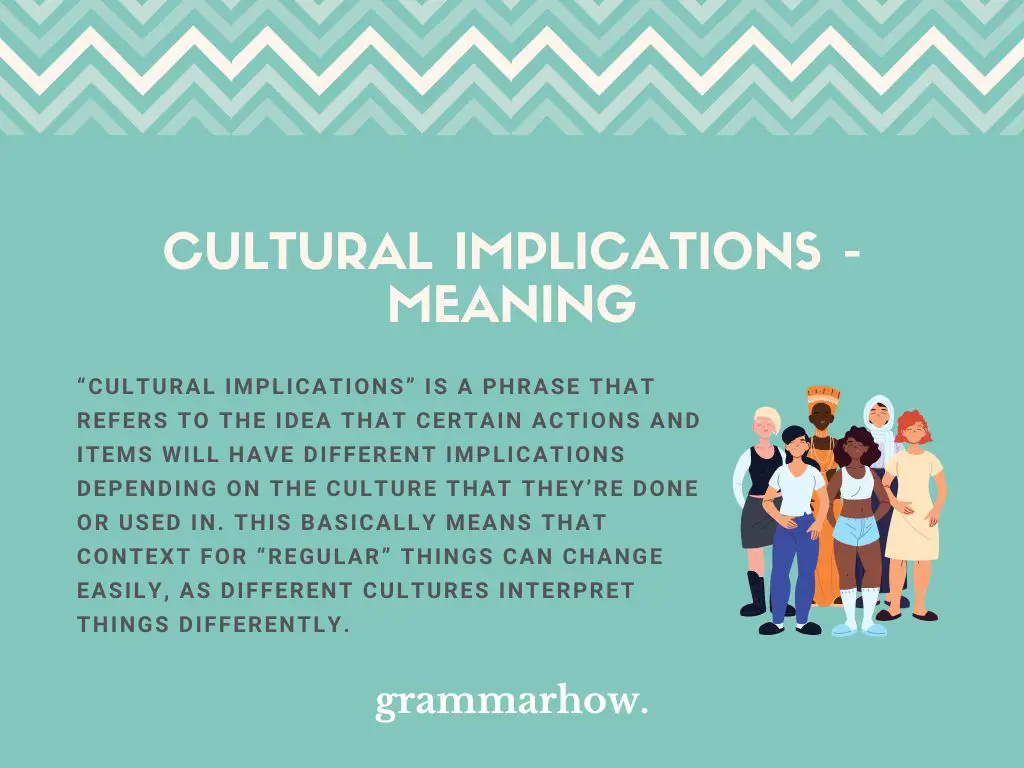If you’ve been around conversations of a certain depth, you may have heard the expression “cultural implications”. But what does this phrase actually mean? And how could you use it in your own sentences? This article will answer these questions by presenting you with example sentences.
Cultural Implications – Meaning
“Cultural implications” is a phrase that refers to the idea that certain actions and items will have different implications depending on the culture that they’re done or used in. This basically means that context for “regular” things can change easily, as different cultures interpret things differently.

Therefore, “cultural implications” is a good shorthand to refer to the concept that, for example, something that is seen as rude in one culture can be polite in a different culture, both interpretations are valid.
The phrase “cultural implications” helps us understand that no culture reigns supreme over all other cultures, and we need to be understanding of the fact that many things we take for granted are actually subjective.
How to Use “Cultural Implications” in a Sentence
Once you’ve familiarized yourself with what “cultural implications” means, incorporating the expression into your own sentences is not very difficult at all. To help you understand that, we’ve compiled several example sentences all containing the phrase “cultural implications” for you to witness how you could use it:
- The cultural implications of what he had done, he didn’t fully understand just yet.
- That greeting has different cultural implications here, so you’ll have to be careful, I’m afraid.
- I think it’s important we all take a step back to consider the cultural implications of our actions.
- If you think about the cultural implications of different times of day, you’ll see what I mean.
- The cultural implications of this meal in particular imply that the person likes you a lot.
- You don’t realize it, but the cultural implications of this card mean that she’s in love with you.
- The cultural implications of the movie meant that it was interpreted differently in various countries.
What Are Examples of Cultural Implications?
Cultural implications manifest themselves in all areas of life, because they’re obviously an incredibly broad subject. Here are some examples of cultural implications and differences in different fields:
Cultural Implications In Research
There are cultural implications that shape how people do their own research. Because culture shapes practically every aspect of our own lives, those aspects then go on to guide the way that we conduct our own research, so there are cultural implications that determine how we research something.
Cultural Implications In Nursing
There are cultural implications when it comes to the way that nursing works in different cultures. For example, religion plays a huge part in the way that nursing is perceived by people. Someone who is Muslim will interpret nursing differently than a Christian, or a Buddhist. These are cultural implications.
Cultural Implications In Business
The modern world means that countries and cultures from all around the world do business with each other. An example of cultural implications in business is the fact that McDonald’s was successful in China because they realized that Chinese people eat more chicken than beef, and adjusted their menu.
Cultural Implications For Mental Health
When you think about the cultural implications that mental health has, you can consider the fact that mental health is considered taboo in some cultures, while others are significantly more open to the fact that people tend to have mental health issues. These are all different cultural implications.
Cultural Implications In Counseling
Cultural implications are something that counselors often have to take into account, as they have to deal with groups of people that might be composed of multiple cultures, and these cultures naturally inform how those people are behaving in the first place.
Cultural Implications – Synonyms
The phrase “cultural implications” points towards the fact that some actions have different reactions and impacts depending on the culture that they happen in. There are other phrases in the English language that point towards this fact, and here are some of these phrases:
- Cultural differences
- Cultural undertones
- Cultural highlights
- Cultural suggestions
Incorrect Ways to Use “Cultural Implications”
“Cultural implications” is a phrase that is mainly used to talk about the fact that different cultures have distinct and unique reactions to certain actions. An incorrect way to use “cultural implications” is to use it as a general phrase talking about all cultures in the world at once.
This is an incorrect use of the phrase because it’s an expression designed to highlight differences, and you’d therefore be using it for the exact opposite of the intended purpose.
In What Situations Can You Use “Cultural Implications”?
“Cultural implications” can be used in basically any situation where you want to highlight the fact that an action has different interpretations by different cultures. For example, you can use “cultural implications” when talking about different ways to greet people around the world.
You can also use “cultural implications” when talking about the context and significance that different meals have in different countries, and how those might vary depending on the culture.

Martin holds a Master’s degree in Finance and International Business. He has six years of experience in professional communication with clients, executives, and colleagues. Furthermore, he has teaching experience from Aarhus University. Martin has been featured as an expert in communication and teaching on Forbes and Shopify. Read more about Martin here.
